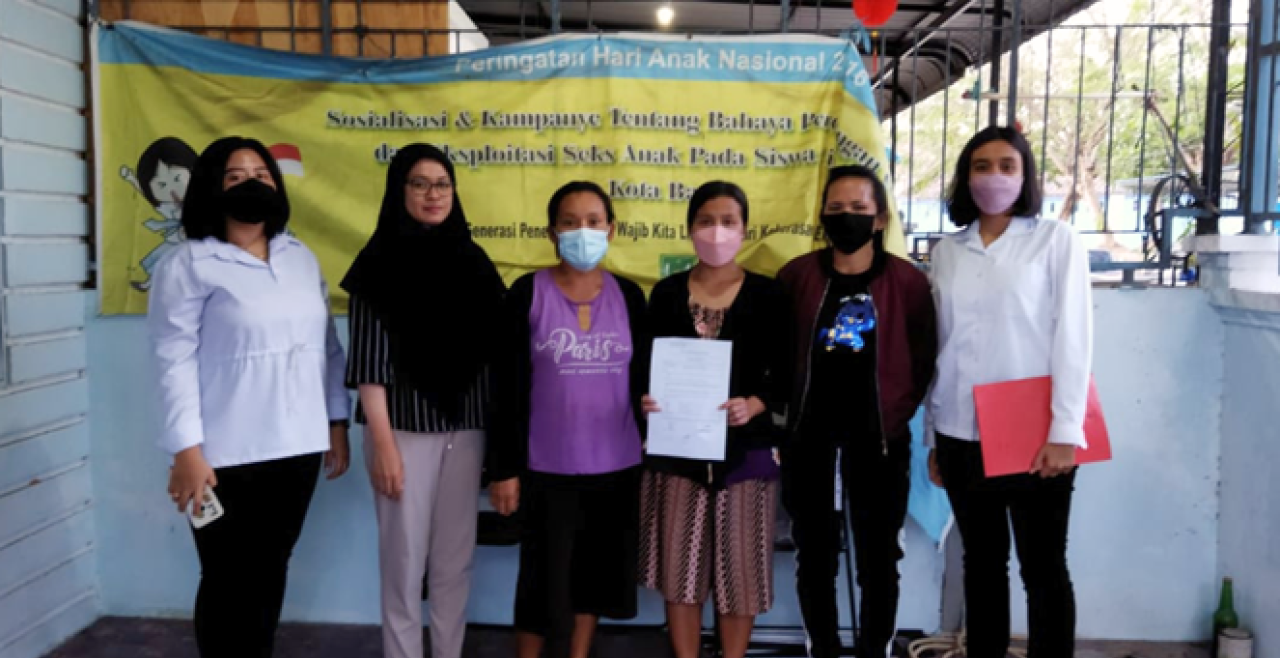"I feel safe" - How Spotlight Initiative is meeting the needs of trafficking survivors

KEPULAUAN RIAU, Indonesia - Poverty and limited access to decent work have always pushed women workers to seek opportunities through migration, even during the COVID-19 pandemic.
This was the case for Bening, who accepted a job as a domestic worker in Malaysia after stumbling across a Facebook post. Bening has years of experience as a domestic worker in several cities in Indonesia.
She was later told that she would be transferred to Singapore, but due to pandemic-related travel restrictions, she was refused entry to Singapore when she arrived at the border. Bening and two other women were returned to Batam Island where they were locked up in a house for two weeks. Here, they were forced to do housework such as washing, cooking and cleaning while they supposedly waited for another placement. They were made to sleep on the floor and were not provided with proper food.
It wasn't until Batam Barelang Police raided the house after receiving reports from local residents who suspected the existence of an illegal shelter that Bening and her friends were released. They were then referred to the Embun Pelangi Foundation (YEP) to receive protection services at a temporary shelter while awaiting legal proceedings in court.
Through YEP, Bening learned about her rights as a migrant worker and the different forms of gender-based violence. “While at the Embun Pelangi Foundation shelter, I feel safe and I've also learned about violence against women and how to work abroad safely,” she says.
"I've learned about violence against women and how to work abroad safely." - Bening, Migrant Worker
Pandemic-related spike in trafficking
Migrant workers like Bening are particularly vulnerable to exploitation, violence and trafficking.
In Indonesia, the Ministry of Women's Empowerment and Child Protection indicates that trafficking in persons increased sharply during the pandemic, almost doubling from 213 cases in 2019 to 400 cases in 2020. Meanwhile, requests for the protection of witnesses and victims of trafficking increased by more than 15 per cent, according to the Witness and Victim Protection Agency (LPSK).
Gender-based violence among women migrant workers is complex due to the different types of violence, locations and perpetrators of abuse involved. Abuse can occur in each stage of migration, from recruitment to their return to their country of origin.
Through the Safe and Fair programme, the Spotlight Initiative supports Embun Pelangi Foundation to deliver services to migrant women workers who need them. It is helping to improve their ability to connect health, justice, social and labour services in a way that puts the survivor's needs first.
"This update helps us to better document cases and improve services according to the needs of victims." - YEP Executive Director, Irwan Setiawan
Multi-sectoral coordination provides critical links between services
With the limited availability of government-run service institutions, community-based service providers play a crucial role in supporting survivors. They are often closer and more accessible to communities.
YEP’s standard operational procedures (SOP) for delivering services to women and children subjected to violence are constantly updated in accordance with the guidelines and protocols developed by UN Women in partnership with the Ministry of Women Empowerment and Child Protection (MOWECP).
"Updating the SOP not only ensures that services for survivors continue to run during the pandemic, but also serves as a guide for us, as caregivers, to maintain our safety and security while delivering services for the victims," says YEP Shelter Head, Rita Ramadhani.
Case intake forms must also be updated to document incidents of gender-based violence toward women migrant workers. This could later serve as the foundation for improving services for victims.
“The incidents [of violence] experienced by women migrant workers that get the most attention in our area are trafficking in persons," says YEP Executive Director, Irwan Setiawan. "[But] women migrant workers experience gender-based violence other than trafficking... This update of the SOP and case documentation forms help us to better document cases and improve services according to the needs of victims."
Written by Jeanne Pauline Alvarez with reporting by Yuni Asriyanti
